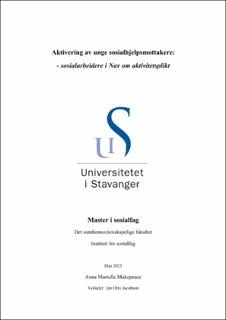| dc.contributor.advisor | Jacobsen, Jan Otto | |
| dc.contributor.author | Makepeace, Anna Marielle | |
| dc.date.accessioned | 2023-07-15T15:51:27Z | |
| dc.date.available | 2023-07-15T15:51:27Z | |
| dc.date.issued | 2023 | |
| dc.identifier | no.uis:inspera:150066902:1875015 | |
| dc.identifier.uri | https://hdl.handle.net/11250/3079207 | |
| dc.description.abstract | Studien har som formål å belyse Nav-veilederes holdninger til og erfaringer med aktiveringsplikten overfor unge sosialhjelpsmottakere. Studien baserer seg på ustrukturerte kvalitative intervju av fire sosialfaglige veiledere i Nav våren 2023. Hovedfunn er at sosialarbeiderne er positive til aktivitetsplikten om den er brukt på en hensiktsmessig måte. Det vises til utfordrende sider ved aktiveringsarbeidet med unge, som beskrives som særlig vanskelige å få kontakt med samt utfordrende å motivere til aktivitet. Videre er veilederne mer kritiske til å benytte sanksjoner og advarsler om stønadstrekk, da det ikke synes å ha ønsket effekt på de yngste brukerne og kan føre til negative konsekvenser for de mest sårbare. Avslutningsvis vises det til funn av ulike holdninger hos de som fortsatt var ansatt i Nav og en av informantene som nylig hadde sluttet. En mulig forklaring på dette er store variasjoner i utforming og organisering av tiltak. En annen forklaring er Navs muligheter for å forme sine ansattes holdninger og praksis. Funnene diskuteres blant annet i lys av teorier om læring, sosialisering og disiplinering i forvaltningen. | |
| dc.description.abstract | This study aims to highlight the experiences and attitudes of social workers in the Norwegian Labour and Welfare Organization (Nav) towards the mandatory activation policies of young social welfare recipients. The study is based on unstructured qualitative interviews conducted with four social work advisors in Nav. The main findings indicate that social workers hold a positive view of the mandatory activation requirements when they are implemented in an appropriate manner. Challenging aspects of activating young individuals are described, highlighting difficulties in establishing contact and motivating them to participate in activities. Furthermore, social work advisors are more cautious about the use of sanctions, as they don´t seem to have the desired effect on youths and can result in negative consequences for the more vulnerable welfare recipients. Lastly, the study reveals varying attitudes among those who are still employed by Nav and one informant who recently left. One possible explanation for this is significant variations in organizing of the mandatory activities. Another explanation is Nav´s potential to shape its employees´ attitudes and practises. These findings are discussed using theories about Nav as an environment for the learning, socialising and qualifying of activation workers. | |
| dc.language | nob | |
| dc.publisher | uis | |
| dc.title | Aktivering av unge sosialhjelpsmottakere: sosialarbeidere i Nav om aktivitetsplikt | |
| dc.type | Master thesis | |
